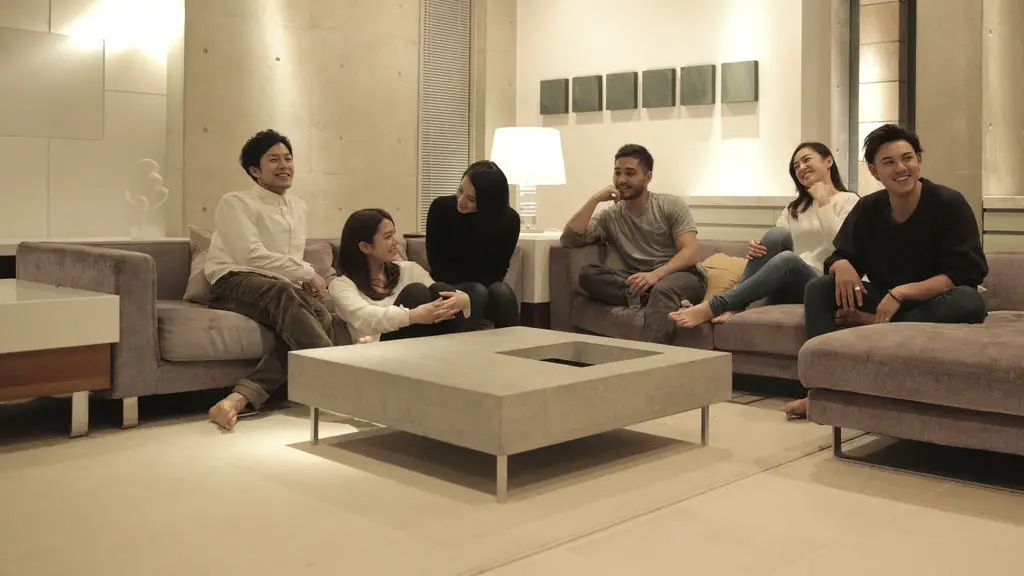When it comes to reality shows, most people think of trashy programs filled with scripted drama. From “Big Brother” to “Toddlers & Tiaras,” fans and haters alike refer to this genre of television as a guilty pleasure at best and a heap of unseemly human tawdry at worst.
However, a certain Netflix reality show titled “Terrace House” defies the expectations of the classic Western reality show while simultaneously providing a new take on the genre.
Beginning as a reality program airing exclusively in Japan, “Terrace House” was acquired by Netflix to be rebooted in partnership with Fuji Television. 2015 marked the premiere year of the first new season, “Terrace House: Boys & Girls in the City,” which was filmed in Tokyo.
After the success of this season, two more seasons followed in 2016 (“Terrace House: Aloha State”) and in 2017 (“Terrace House: Opening New Doors”), taking place in Hawaii and Karuizawa, Japan respectively.
The format of the show is relatively simple: three men and three women, who are essentially strangers, live in a house together for the duration of the filming. After they are selected as one of the cast, these house members live their daily lives as before and are more or less free to leave the show whenever they please.
The opening spiel of every episode is as follows, “‘Terrace House’ is a show about six strangers living together, and we observe how they interact. All we’ve prepared is a beautiful home and a beautiful automobile. There is no script at all.” And for the most part, they keep true to their word.
https://www.youtube.com/watch?v=4qBl7_t0M_U
See, the appeal of “Terrace House” lies largely in the fact that it feels like a show that takes the term “reality TV” literally. As you watch these strangers interact in what seems to be an inorganic setting, everything about the situation seems surprisingly natural.
The show is shot well enough to the point that the camera feels like a window into the cast’s lives. Somehow there exists a certain calmness as you watch each episode, maintaining a mundanity so conventional that it’s almost comforting. No screaming matches, no scandalous antics, no backstabbing.
Because of the lack of that typical American-style reality show competition, there is no forced drama within the house. The only problems that arise are caused by the cast themselves, just as they would happen in real life.
For example, there is a point during “Terrace House: Boys & Girls in the City” where a guy named Yuki is interested in one of his housemates, Yuriko. Just as Yuki believes she is going to confess her feelings for him, Yuriko announces that she is going back to her ex-boyfriend, completely oblivious to Yuki’s feelings.
As he tries to hold in his disappointment, he tells Yuriko that it had been a good day just to placate her. These silent heartbreaks often make up the core drama of “Terrace House,” which can easily strike a chord with those who are watching.
However, the drama that transpires in the show is so minimal that you can’t go into it solely looking for something scandalous to happen. In fact, it’s much more fun to observe the entire cast objectively to see who you like best.
Whether there’s a person, friendship or romance you’re particularly fond of, something will inevitably strike your fancy. One such example is Yusuke from “Terrace House: Aloha State,” the 18-year-old guitarist who confesses that he’s never had a girlfriend.
His humble and earnest attitude brought a certain freshness to the house, especially when comparing him to his more-experienced counterparts. There are many fan favorites strewn throughout the series, but it’s ultimately up to you to choose a favorite.
In fact, one of the most appealing aspects of the show is its running commentary of the house’s events. “Terrace House” has a panel of Japanese celebrities who appear in several cuts per episode just to analyze whatever has just transpired, mostly providing comic relief.
They bicker about who likes whom, whether or not a certain person is hostile toward another and who is charming versus who is unlikeable. Because banter of this nature is included, it validates the audience’s feelings about the show even if they have no one in real life to discuss it with.
After all, the whole point of a reality show is to form opinions about these complete strangers you’re watching. For many people, this format is much more preferable compared to having the cast members’ interviews spliced throughout a show. When only the hosts are commentating, the audience doesn’t necessarily know what anyone in the house is thinking unless it is stated explicitly, yet again mimicking real life.
Of course, there are still some things that make the show less than perfect, as is the case for any series. Because the primary goal of this reality program is to entertain by putting people’s lives on display, sometimes representation gets thrown out the window a bit. The people featured on the show are typically cisgender, straight and conventionally attractive, often conforming to heteronormative stereotypes.
Sometimes there will be hints of what a Western millennial audience could perceive as internalized misogyny, with seemingly thoughtless comments thrown around regarding gender roles. On more than one occasion, the housemates will mention how it’s good for the girls in the house to do the cooking, or how a guy who is interested in one of his female castmates is expected to take the lead on asking her out.
Though comments like these aren’t necessarily meant to be derogatory, they can still make the watcher a tad uncomfortable. But rather than attributing such faults to the makers of “Terrace House,” this is more of an issue regarding conservatism in Japanese culture. At the end of the day, the viewer asked for an honest portrayal of these people’s lives.
Considering all of its strengths and weaknesses, “Terrace House” is nonetheless still worth a watch. If you’re looking for a simple Netflix binge that you can watch without consequences, this is the perfect fix.
You can forget about your own problems for a while and invest your time in watching the troubles of others. Though it certainly isn’t a life-changing experience, “Terrace House” is definitely a landmark series in the choppy sea that is reality TV.
















